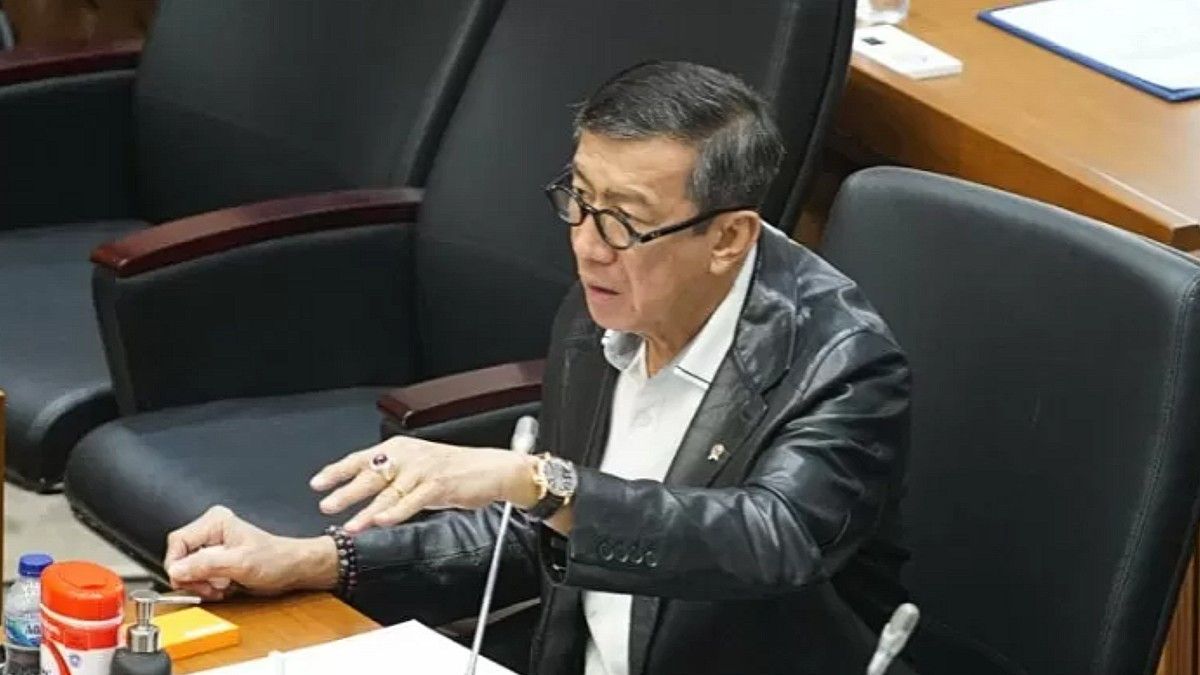JAKARTA - Minister of Law and Human Rights (Menkumham) Yasonna H Laoly said the ratification of the Draft Law on the Criminal Code, aka the Criminal Code Bill or RKUHP, contained criminal expansion of the perpetrators.
"The Criminal Code Bill expands the penalties that can be imposed on perpetrators of criminal acts. There are three crimes regulated in this Criminal Code Bill, namely principal, additional, and special crimes," Yasonna said at the DPR Plenary Meeting at the Parliament Complex, Jakarta, Tuesday, December 6.
He explained, related to the main sentence, RKUHP not only regulates imprisonment and fines, but adds to the crime of closing, supervising, and social work in the context of restorative justice.
Yasonna emphasized that the big change in the RKUHP was not placing the death penalty as a basic but special punishment which was always threatened alternatively and imposed with a probationary period of 10 years with the defendant's consideration of showing regret.
"The death penalty is placed specifically which is always threatened alternatively and imposed with a probationary period of 10 years with the consideration that the defendant shows regret and there is hope that improving his life or his role in a crime will not be too important," he said.
He said that the prison sentence regulated in the Criminal Code Bill was carried out significantly, namely that the guidelines contained certain conditions were regulated so as not to be sentenced to imprisonment for perpetrators of crimes aged over 75 years, only for the first time doing so, and several other circumstances.
However, according to him, on the basis of prioritizing justice, the provisions of exceptions to certain circumstances are regulated, namely related to criminal acts that are threatened with imprisonment for more than five years, criminal acts that endanger or harm the community and the country's economy.
Yasonna explained that in addition to the main sentence, perpetrators of criminal acts can be subject to additional penalties, such as revocation of certain rights, confiscation of goods, payment of compensation, revocation of permits, and fulfillment of local customs.
"Criminal actors committed by a person or corporation can be subject to actions that are a tangible manifestation of the application of a double track system in punishment in Indonesia. For example, what actions can be imposed on the main crime and actions imposed on people with mental disabilities or intellectual disabilities," he said.
Yasonna explained that the RKUHP contained a criminal expansion as an acknowledgment of justice, such as the expansion of accountability which includes based on mistakes and forms seen from the expansion of legal subjects including corporations.
According to him, progress in the field of economics and finance, especially globalization and the development of criminal acts organized at the national and transnational levels, requires the formulation of the Criminal Code to include legal entities or corporations as responsible parties.
"The imposition of principal and additional penalties is imposed on corporations that commit crimes as well as people involved in these corporations, such as administrators who have functional positions, give orders, control holders and beneficiaries," he said.
Yasonna assessed that on the one hand, it is not easy for countries like Indonesia that are multiculture and multiethnic to make legal codifications that can accommodate all interests.
However, according to him, on the other hand, national criminal law material manifested in the Criminal Code Bill must regulate the balance between public-individual interests, protection of perpetrators and victims, legal certainty and justice, written laws and those living in society, national-universal values, human rights and human obligations.
"On this basis, the government conducts socialization and public discussion in 11 cities in 2021 and public dialogue in 11 cities in 2022. This activity was attended by law enforcement officers, academics, community leaders, religious leaders, student organizations, and the National Criminal Code reform alliance," he said.
Previously, the DPR Plenary Meeting approved the RKUHP to be ratified into law today, Tuesday, December 6.
"Can the Criminal Code Bill be approved to be passed into law," said Deputy Speaker of the Indonesian House of Representatives Sufmi Dasco Ahmad at the DPR Plenary Meeting at the Parliament Complex, Jakarta, Tuesday, December 6.
After that, all members of the DPR who attended approved the RKUHP to be ratified into law.
Dasco said all factions had expressed their opinion at level I regarding the RKUHP to be brought to the DPR Plenary Meeting for decision making.
The English, Chinese, Japanese, Arabic, and French versions are automatically generated by the AI. So there may still be inaccuracies in translating, please always see Indonesian as our main language. (system supported by DigitalSiber.id)











